- Adding the Import Export Tools NG Add-on
- Creating a Local Folder to Test the Import Function
- Importing Email into Thunderbird
- Import mbox file
- Import messages
- Import all messages from a directory
- Exporting Mail in Thunderbird
- Exporting one or more folders as mbox files
- Exporting messages in different formats
- Summary: Import and Export Email in Thunderbird
If you need to import and export email in Thunderbird, here is the information you are looking for. In this article, I will explain what kind of messages are supported by Thunderbird's mail importing and exporting features, as well as show you how to import/export emails in Thunderbird.

Thunderbird is a popular free open-source email client from the Mozilla Foundation. Besides being an email client, it is also an RSS, chat, and news client and a personal information manager with a calendar and task manager. In this article, we will check out how to export emails from Thunderbird, and how to import emails into thunderbird from an external account or file.
Adding the Import Export Tools NG Add-on
To be able to import or export email using Thunderbird, we need to have download the Import Export Tools NG add-on. From the Thunderbird window, select the hamburger menu on the extreme right-hand top corner. From the drop-down menu select Add-ons.
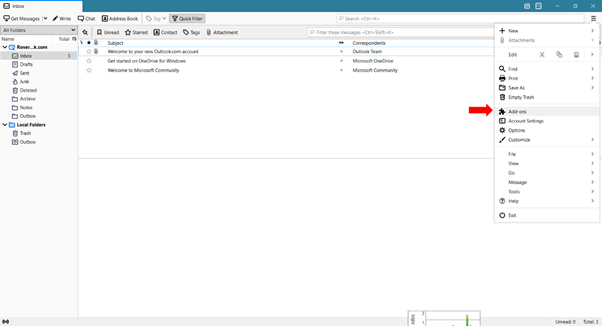
You should see the Add-ons window, where you can type import in the search window and press Enter.
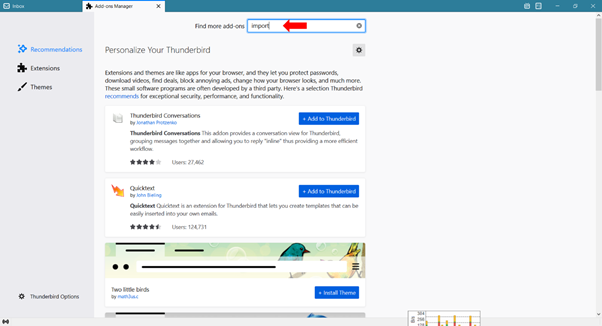
Thunderbird will search the Internet and you should see the following add-on…Import Export Tools NG. Click on + Add to Thunderbird.
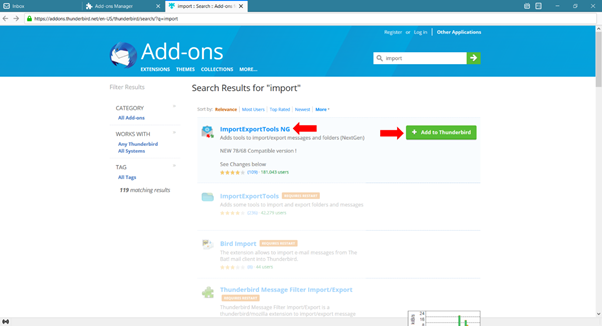
This will add the add-on to your copy of Thunderbird after you click on Add and then OK.
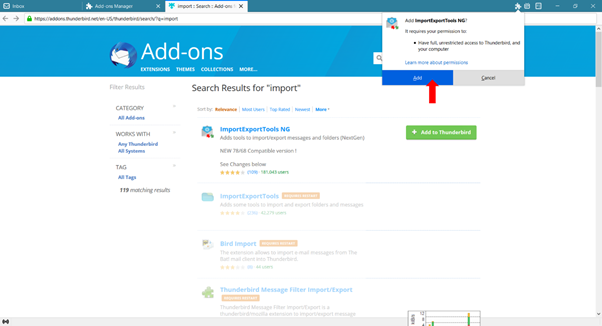
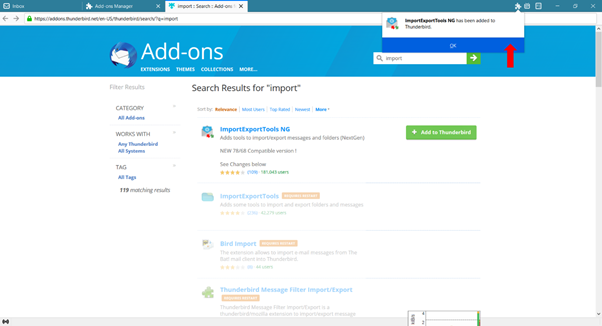
The Import Export Tools NG add-on is now a part of Thunderbird and you can begin importing or exporting mails.
Thunderbird can import and export mbox or .EML files using the Import Export Tools NG add-on.
Creating a Local Folder to Test the Import Function
We will just create a local folder in the Local Folders of Thunderbird to store the email we import. We will call this folder Import Test. In Thunderbird, right-click on Local Folders and select New Folder. Then name the folder Import Test.
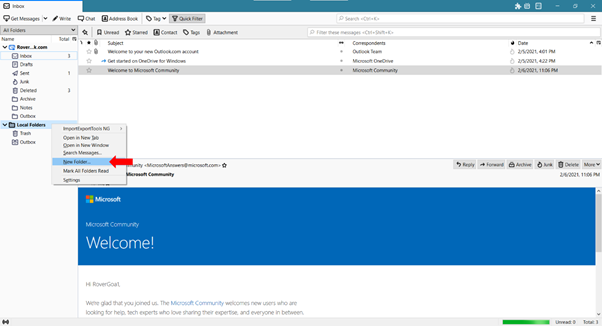
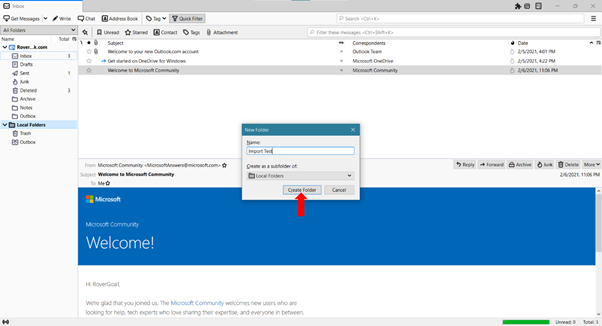
Importing Email into Thunderbird
To import, we right-click on the Import Test folder and select Import Export Tools NG to see its sub-options.
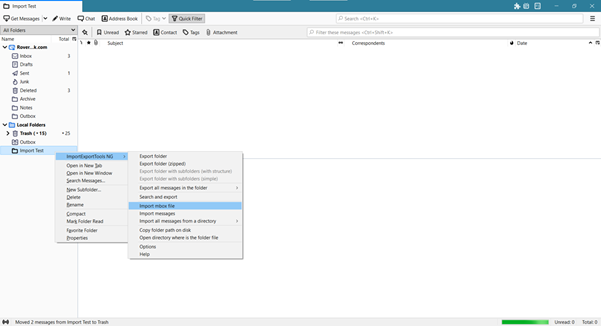
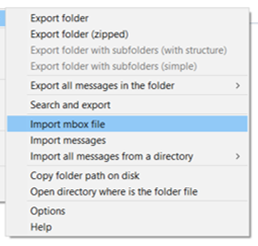
You see three options for importing: Import mbox file, Import messages, and Import all messages from a directory.
Import mbox file
Choose this option if you want to import one or more mbox files. This shows the following dialog.
Select one of the first two options to import files from one or more mbox files. The second option will also import the subdirectories of the mbox file if there are any.
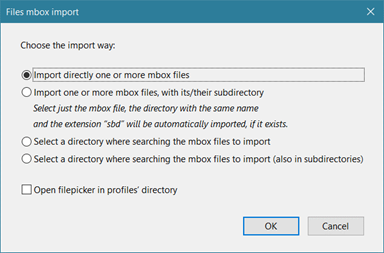
Select one of the last two options if you have a directory that has more than one mbox file.
Whichever option you select, you will be asked to select the file/s or folder/s that you want to import and the import will happen when you click OK.
Import messages
This option is used if you have a directory that has .EML messages. When you select this option you can select the directory/folder which has the messages and they will be imported.
Import all messages from a directory
This option is used when you want all the messages in a directory/folder on your disc to be imported. It has two sub-options: just from the directory and also from its subdirectories. Choose the appropriate option, choose the folder, and click OK to have the email imported.
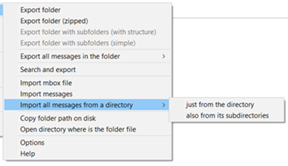
Exporting Mail in Thunderbird
Email can be exported either as mbox files or as .EML files.
Exporting a complete folder with subfolders as mbox files.
If we right-click on an email ID in the left pane and select Import Export Tools NG, we will see:
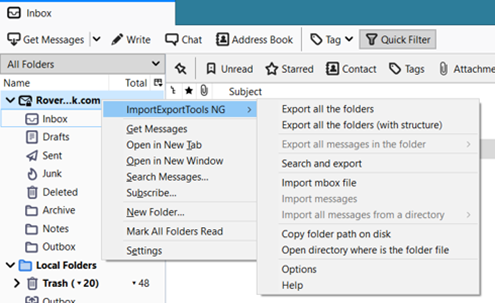
Export all the folders will export all the folders (in this example, the Inbox, Drafts, Sent, Junk, Deleted, Archive, Notes, and Outbox). Export all the folders (with structure) will maintain the subfolder structure.
Exporting one or more folders as mbox files
Let us say we only want to export the Inbox messages. Or we only want to export the messages in the Inbox, Sent, and Deleted folders. Then just select the folder/s that you want to export, right-click and select the Import Export Tools NG option to see:
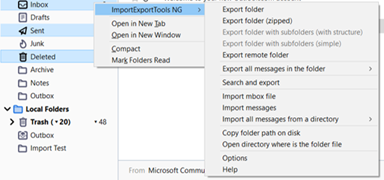
Click on the Export folder or Export folder (zipped) option to export the email to a folder you will need to select.
Exporting messages in different formats
To export messages in .EML or other formats, select the folder/s from which you want to export messages, then right-click, select Import Export Tools NG, and then Export all messages in the folder. You should see another flyout menu with the various suboptions as follows:
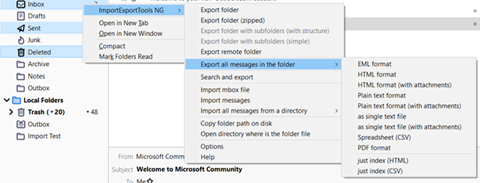
Select the format you want to export the messages in from the list. Then select the folder on your disc where you want to store the messages and click OK to do the export.
Summary: Import and Export Email in Thunderbird
- Select Tools > Import.
- Select the type of information you want to import, then choose Next.
- Choose which type of file contains the information you want to import, then choose Next.
- Select the location where your information is located, then choose Next.
- Select the items you want to import into Thunderbird and then choose Next.